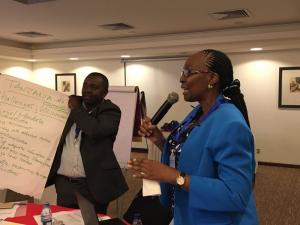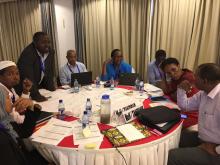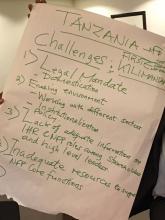Strengthening capacity to implement International Health Regulations (IHR)
Dar es Salaam, 27 April 2018: A four-day face to face workshop to provide strategic direction, capacity building and strengthening of the International Health Regulations (IHR, 2005) National Focal Points (IHR, NFPs) in the World Health Organisation, African region took place last week in Dar Es Salaam.
The workshop aimed at improving coordination and communication capacity of the NFPs. The workshop will also facilitate the sharing of experiences with respect to the IHR NFP operations, as well as, support the establishment of the IHR NFP Knowledge Network in the World Health Organisation (WHO) African region.
Under the IHR (2005) all countries are required to establish and sustain the minimum core public health capacities stipulated under the regulations. The National IHR Focal Point, the national centre designated by each country has mandatory functions such as notification and information sharing and should be accessible at all times for communications with WHO IHR Contact Points and with other countries.
The WHO African region is committed to strengthening and maintaining a robust network of NFPs by holding regular regional and global meetings for training and capacity building. This aimed at facilitating peer-to-peer learning and sharing of best practices/lessons learnt to accelerate IHR implementation.
The workshop was officially opened by Dr Mohammed Bakari, the Chief Medical Officer (CMO) of the MOHCDGEC. In his opening remarks, Dr Bakari noted that the workshop has come at the right time, as many African countries including Tanzania are currently facing many health challenges and the world is prone to the international spread of disease due to technological advancements and increased air travel. Dr Bakari emphasized that countries should urgently strengthen their core capacities for public health emergency preparedness and response to public health threats as stipulated in the IHR 2005.
The WHO country representative for Tanzania, represented by Ms. Rose Shija, the Officer In Charge noted that the implementation of IHR (2005) in all member states requires an effectively functioning NFP network for the successful implementation of the IHR. The Officer in Charge also stressed the need for an all-hazard approach to emergency preparedness programmes that bring together all relevant sectors under pinned on the “One Health Approach”. Dr Ambrose Talisuna, speaking on behalf of the WHO regional office for Africa, reminded the participants that a highly mobile, interdependent and interconnected world provides opportunities for both the rapid spread of risks and the improvement of global preparedness and response to potential public health emergencies that may have an international impact and hence the importance of having a competent IHR NFP.
The workshop has brought together IHR NFPs (over 56 participants) from 16 English speaking countries, the WHO Head Quarter experts from Lyon and Geneva, as well as, several partner agencies, including: the US Centers For Disease Control, Resolve to save Lives, Public Health England and experts from the Americas.






